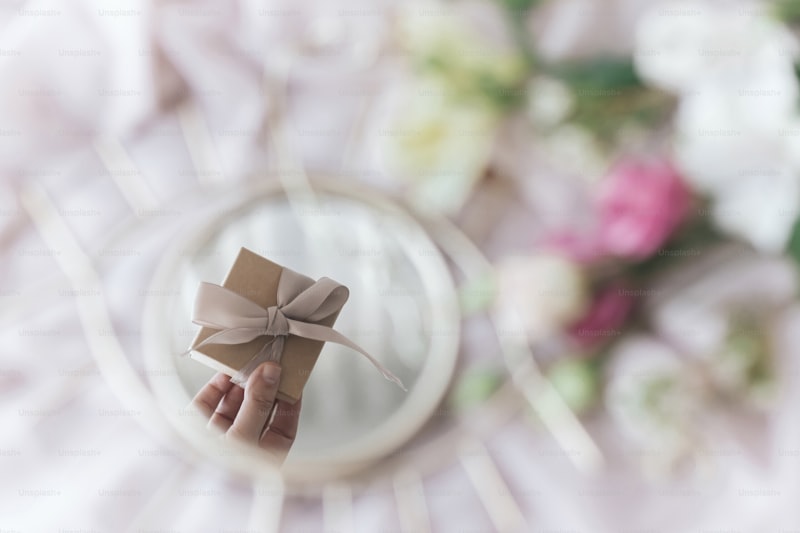Cultural Influences on Wedding Gifts: A Global Perspective
The Rich Tapestry of Wedding Gifting Across Cultures
Weddings are a universal celebration of love and commitment, each steeped in cultural significance that shapes the entire event, including the gifts exchanged. The act of giving presents to a newlywed couple varies widely across different cultures, reflecting the values, traditions, and histories of each society. Understanding these cultural influences on wedding gifts not only enriches our appreciation of global diversity but also helps us select the most appropriate gifts for our friends and loved ones as they embark on their marital journey.
Understanding Cultural Contexts
The practice of giving wedding gifts dates back to ancient times, but the meanings and traditions surrounding these gifts can differ dramatically based on cultural context. The cultural norms surrounding gifts may be influenced by factors such as religion, societal status, and family ties. Let's explore some of these diverse influences and how they shape the expectations and norms around wedding gifting.
1. Asia: Symbolism and Practicality
In many Asian cultures, wedding gifts often carry deep symbolic meanings. For instance, in Chinese tradition, giving gifts in red envelopes (known as "hongbao") symbolizes good luck and happiness. The amount of money given usually ends in an even number, as odd numbers are reserved for funerals.
| Country | Gift Example | Meaning |
| China | Hongbao (red envelopes) | Good fortune |
| India | Gold jewelry | Wealth and prosperity |
| Japan | Cash in special envelopes | Support for the new couple |
In India, gifting gold jewelry is a common practice, signifying wealth and prosperity. Meanwhile, in Japan, cash is often given in specially designed envelopes called "shugi-bukuro," reflecting the couple’s love and support for their new life together.
2. Western Cultures: Registry and Personalization
In many Western cultures, the concept of a wedding registry has become increasingly popular. Couples create a list of desired gifts in advance, allowing guests to give gifts that they know the couple will appreciate. This practice not only makes gift-giving easier but also reflects modern living, where practicality often plays a key role. Items may range from kitchenware to home decor, invariably tailored to the couple's lifestyle.

Notably, in the U.S., it is customary for guests to check the couple's registry before purchasing gifts. This helps to avoid duplicate items and ensures that each gift is appreciated and useful. However, thoughtful personalization of gifts remains significant; many couples cherish handmade items or experiences, such as a cooking class or a romantic getaway.
3. Middle Eastern Traditions: Generosity and Community
In the Middle East, weddings are often grand affairs characterized by lavish celebrations that emphasize community involvement. Gift-giving is seen not merely as an obligation but as an opportunity to express generosity. Guests may give money or valuable household items, reflecting their desire to contribute to the new couple’s prosperity.
In some traditions, the gifts presented at weddings are often accompanied by a set of expectations that call for a reciprocal gesture during future events, keeping the cycle of generosity alive within the community.
Factors Influencing Gift Selection
As couples navigate their wedding planning, understanding the various cultural influences on their gift choices is vital. Below are factors that play a role in gift selection across cultures:
1. Cultural Significance
The importance of cultural context cannot be overstated. Many cultures have specific items deemed suitable as gifts. For instance, in some African traditions, handcrafted items like woven baskets or artisanal crafts are favored, infused with significant cultural meaning.
2. Socioeconomic Status
Another influencing factor is the socioeconomic status of the couple and their families. In some cultures, affluent families might opt for extravagant gifts, whereas others might focus on practicality and offering gifts that facilitate the couple's new lifestyle, such as appliances or home goods.
3. Traditions and Modern Influences
Modern influences are also noteworthy, as global connectivity and the internet allow couples to blend traditional gifting practices with contemporary expectations. Many now consider sustainability when selecting wedding gifts, with eco-friendly products gaining popularity across varying cultures.
Gift Ideas for Different Cultures
Here are some thoughtful gift ideas that honor the cultural influences surrounding wedding gifts:
1. Personalized Gifts
A personalized gift, such as custom art depicting the couple’s love story or engraved home accessories, transcends cultural boundaries and serves as a meaningful keepsake for newlyweds.
2. Cash and Gift Cards
Cash is universally accepted and appreciated across many cultures. Couples can use it for future purchases or experiences, making this a simple yet flexible gift option.
3. Experiences Over Items
Opting for experiences such as dining vouchers for a special restaurant or a weekend adventure can create cherished memories and is becoming increasingly favored over traditional physical gifts.
4. Handmade Items
Handcrafted gifts, whether from local artisans or personally made, can express thoughtfulness and carry unique cultural representations, making them special and memorable.
Final Thoughts on Cultural Influences on Wedding Gifts
Understanding cultural influences on wedding gifts provides valuable insights into the nuances of gift-giving. Each culture has its unique traditions, beliefs, and practices that guide how gifts are given and received. As we engage in these diverse customs, it is crucial to embed respect and appreciation for these influences in our choices.
For those preparing to attend a wedding, consider the cultural background of the couple to honor their traditions. Strive to select a gift that resonates with both their values and your relationship with them. Remember, the thought and intention behind a gift often hold more value than the gift itself. Embrace the opportunity to connect with couples across various cultures, celebrate their love, and contribute to their new journey together with meaningful and culturally sensitive gifts.
Key Takeaway: Whether by adhering closely to tradition or embracing modern practices, the act of giving wedding gifts is an opportunity to express love, well-wishes, and support. Through thoughtful consideration of cultural influences, we can uplift the spirit of gift-giving, reinforcing the bonds of community, friendship, and affection.